

It was a decade of non-stop events in the life of the entity: the start of the Bernabéu saga, the inauguration of O’Donnell Field, the birth of the Madrid-Barcelona rivalry, Madrid’s dominance in the Regional Championship, the title of Real was granted by Alfonso XIII, and the first tour of a European country. Ten years of growth which can boast of many more high points than low ones.
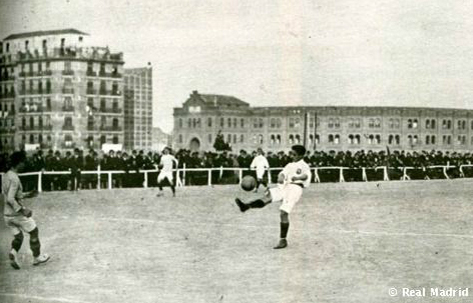
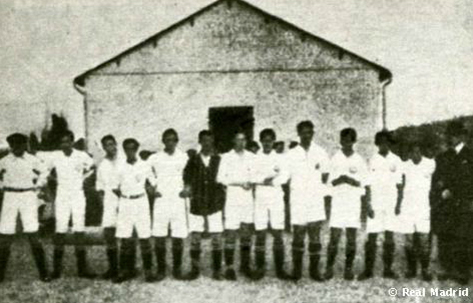
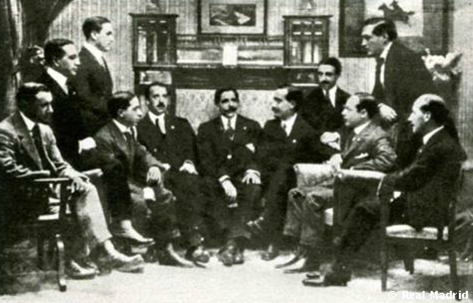
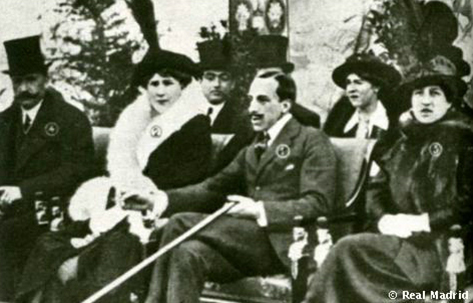
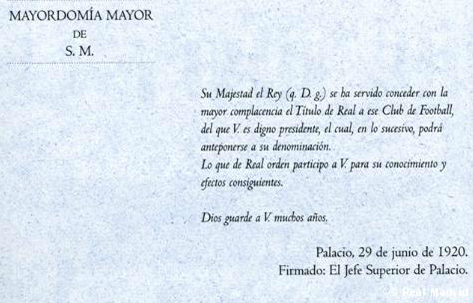
THE BERNABÉU FAMILY SETS FOOT IN THE CLUB
Antonio, Marcelo and Santiago Bernabéu joined Madrid Football Club at the start of the 20th Century and forever left their mark on its history. Antonio had the organisational talent: he was a founding member of Bologna FC and later became President of the Spanish FA, Marcelo was an outstanding player, and Santiago was everything possible for the Club: player, delegate, director, secretary, and President.
BERNABÉU DEBUTS AT THE AGE OF 16
Santiago Bernabéu made his Madrid debut on 3 March 1912 when he was only 16 years old. It was in a friendly against English Sports Club, and it took place at the Pradera del Corregidor, along the Manzanares River in Madrid. The Madridista squad defeated the English side 2-1, and Bernabéu, playing as a left midfielder, scored the winning goal.
CREATION OF THE REGIONAL FA AND HIS FIRST TOURNAMENT
Adolfo Meléndez, two-time President of Madrid (1908-10 and 1913-16), presided over the meeting hosted by Madrid, during which the Madrilenian FA was created. Acting as Secretary, the main overseer of the Club signed the accord which, among other agreements, established the first competition between teams from the city, and whose winner would be elegible to play in the Spanish Championship.
THE REGIONAL TOURNAMENT DECKED IN WHITE
The Regional Championship of the city will always be linked to the history of Real Madrid. While Adolfo Meléndez, President of the Club, pushed for the creation of the tournament, the Madridistas became its domineering participant, winning 12 of the 18 editions.
MADRID-BARCELONA: ETERNAL, EPIC QUALIFIER
The semifinal of the 1916 Spanish Cup between Madrid and Barcelona turned into an eternal and epic elimination round. Because away goals didn’t count twice in those days, the teams had to play four matches to determine the winner. Barça won the first game in the Ciudad Condal 2-1, which Madrid later bested 4-1 on the field of the Spanish capital’s Athletic, where the last two matches were also held. By the end of regulation time in the first, the score was a 4-4 draw, which ended 6-6 by the end of injury time. Finally, Madrid defeated Barcelona 4-2 in the fourth match and qualified for the final.
THE HOSTILITIES BEGIN
In the final match of the aforementioned 1916 Cup semifinals, Barcelona players walked off the pitch with seven minutes remaining in protest of the fourth goal, which they considered to be offside. During the final between Madrid and Athletic Bilbao, hosted by Español in Barcelona, the Guardia Civil, Spain’s Civil Guard, had to protect Madrid players on their way into the dressing room. Later on, rocks and stones were thrown at the bus that transported the team to the hotel. The hostilities between the two Clubs had begun.
ALFONSO XIII GRANTS THE TITLE OF REAL
On 29 June 1920, the Club received a communiqué from the Primary Superintendent of his Majesty the King Alfonso XIII which granted Madrid the title of Real. The decision, which would change the entity’s original name, was eagerly anticipated by the Madridista Directors.
THE FIRST TOUR TAKES PLACE IN ITALY
In 1920, Madrid went on their first tour, comprised of five matches in Italy. The trip was organised by Natalio Rivas, another of the founding members of Bolonga and Madridista player. The budget for the expedition was very small, so the team was forced to eat at the cheapest restaurants they could find.